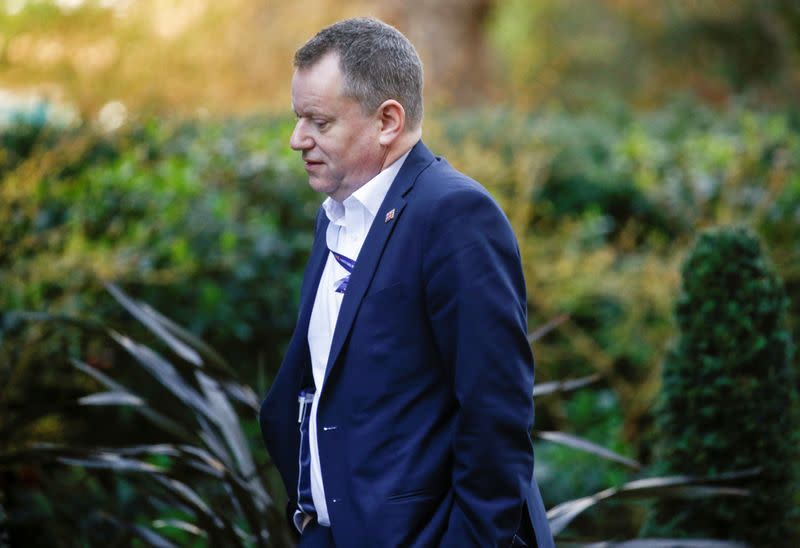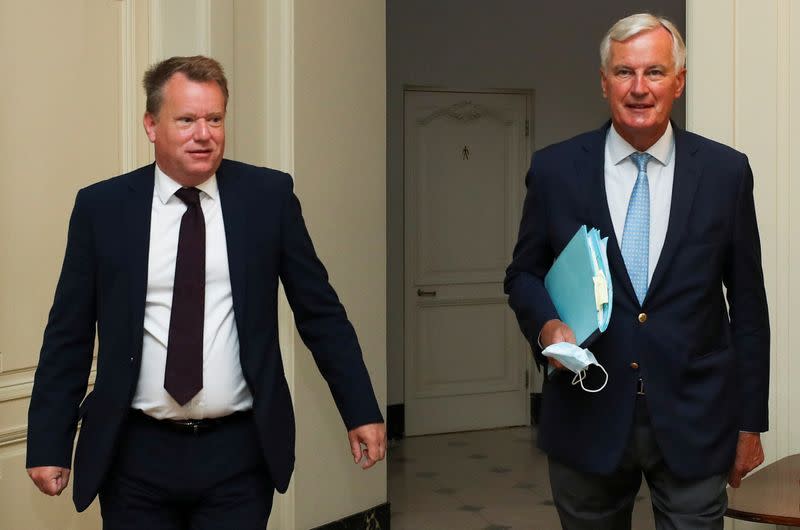UK sees 'landing zone' for Brexit trade deal but tells EU to hurry up
By Guy Faulconbridge, Kate Holton and William James
LONDON (Reuters) - Britain's chief Brexit negotiator said on Wednesday he saw a landing zone for a trade deal with the European Union but sought to use Prime Minister Boris Johnson's deadline of Oct. 15 to hurry the bloc's negotiators towards an agreement.
The two sides say they are inching towards a deal that would govern around $900 billion in trade after Dec. 31 - when the current transitional arrangements end - though sticking points remain on fishing, level playing field issues and governance.
"The landing zone and the nature of the agreement is pretty clear if not exactly pinned down yet," David Frost, the UK's chief Brexit negotiator, told a House of Lords committee.
But Frost cautioned the EU that an Oct. 15 deadline set by Johnson on Sept. 7 remained a deadline. The EU is due to asses progress on a deal at an Oct. 15-16 summit.
Frost added that Britain's "door would never be closed" and that a huge amount of textual work would need to follow Oct. 15 if an outline deal was struck.
"As we approach the 15th -- and it is very close already -- I will have to advise the prime minister on whether the conditions in his statement have been met or not, and we will have to consider the situation at that point," Frost said.
Sterling fell on a Bloomberg report that Britain would pull out of talks next week unless there was clear landing zone for a deal. Sources told Reuters the EU is gearing up to keep negotiating until as late as mid-November.
The United Kingdom formally left the EU on Jan. 31, more than three years after it voted 52%-48% for Brexit in a 2016 referendum. The two sides are now trying to work out how everything from cars to Camembert to whisky will trade.
Johnson told European Council President Charles Michel on Wednesday that some progress had been made but that significant differences remained.
He has repeatedly said he would prefer a Canada-style free trade deal but is ready to accept no-deal -- which would mean tariffs would be imposed on goods under World Trade Organization (WTO) rules.
"NOT AT ANY PRICE"
Johnson's Brexit supremo, Michael Gove, said no-deal preparations were intensifying so that if the EU was intransigent and no good deal was available, the United Kingdom would not be held hostage by the EU.
"Those preparations are intensifying as we speak," Gove said. "While we are obviously keen to get a deal, we will not do a deal at any price."
"If it is the case that the EU insists on an intransigent approach in the weeks ahead, then very well -- we will be ready for that eventuality. It is emphatically not our preference."
The EU replied to Gove within hours.
"The EU prefers a deal, but not at any cost," said Michel. "Time for the UK to put its cards on the table."
While many investment banks say their base case is that a deal will be done, some diplomats fear Johnson could ultimately decide that a no-deal is more attractive in domestic political terms than such a thin trade deal.
The EU's chief negotiator Michel Barnier briefed EU ambassadors in Brussels on Wednesday on the negotiations.
"Barnier did not strike a particularly optimistic tone today," said one diplomat who attended the briefing, adding that expectations for the Brexit-focused EU summit next week were low and negotiations were expected to continue after that.
Emotive issues remain unresolved, such as fishing.
A French EU lawmaker who chairs the European Parliament's fisheries committee told Reuters there could be no annual quota negotiation in a trade deal with Britain, sticking to a tough line from Paris that could make a Brexit deal more difficult.
(Additional reporting by John Chalmers; Writing by Guy Faulconbridge; Editing by Catherine Evans and Gareth Jones)

 Yahoo News
Yahoo News 



